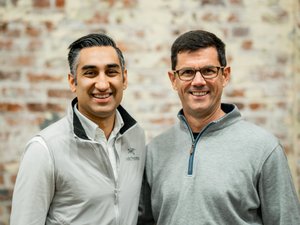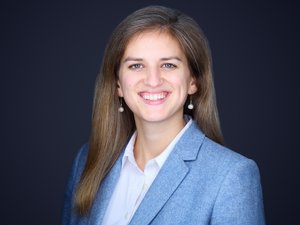
The journey started when Eileen Stephens’ daughter gave her the book “Half the Sky.” In reading it, she learned the jarring statistic that 130 million girls around the world were forced to miss school because they lack access to products that help them manage their periods.
Stephens searched for an existing solution to this problem — and came up empty-handed.
Then she stumbled upon an advertisement for Dollar Shave Club — a subscription for packaged shaving products for men — and thought the business model was unique enough to fit the feminine care space. So they started to explore a similar offering.
Their journey would lead Stephens and her co-founder, Skip Amos, on a life-changing trip to Uganda — and eventually to launch Tavia, a startup built around the one-for-one model popularized by Toms Shoes. The company provides a convenient option for U.S. customers to receive their menstrual products, and each purchase supplies a month’s worth of those products to girls living in Uganda.
While they were in Uganda, Stephens and Amos interviewed over 70 girls about their experiences. In that country, there is a culture of shame around girls’ periods. It’s considered a curse — even with their mothers, sisters and other women in their lives.
“In Uganda, it’s called the week of shame,” Stephens explained. “They disappear for an entire week.”
Missing a week of school has a serious impact on their education, as there are no books or worksheets for them to follow to catch up on the work. Schooling is done in a room of 80 to 125 students with a single teacher writing on a chalkboard. The information is wiped away at the end of each day, along with the girls’ chance of expanding their learning.
One of the most horrifying and moving aspects of the project for Amos has been learning about the lack of access to hygienic products.
“The ways the girls mitigate the problem can cause infections, sores and diseases,” he said. “As soon as I heard that, we looked at each other and knew we had to do something. Two and a half years of work later, here we are.”
The Tavia subscription service allows U.S. customers to create a custom box of tampons and pads comprised of their favorite brands. They knew women are brand-loyal when it comes to their menstrual products and created multiple distributor partnerships to accommodate that. Boxes come in quantities of 15, 20, 25 or 50, and subscribers can determine how often they get a delivery.
Tavia has already established relationships with three schools in Uganda where they provide menstrual products to 550 girls ages 12 to 20.
The process of starting up Tavia has been more challenging and time-consuming than expected. The co-founders have struggled to optimize their website for the highly customized subscription packages. Further distribution difficulties in Uganda brought up unexpected obstacles.
“You can’t just ship the pads to the school,” Amos said. “They are poor and desperate. If we don’t hand-deliver them to the girls, they will end up being sold in a kiosk somewhere. We are personally involved in the giving process.”
This also allows them to have one-on-one contact with the girls to learn about emerging problems and how they can help. Backed by ample research, they believe true community change comes from educating women.
“If you want to pull a community out of poverty, give them water, give them food and educate the girls,” Stephens said. “Women put 90 percent of their income back into their families and community, whereas men put 30 to 40 percent of their income, depending on which study you read. That’s how you create a truly impactful community program.”
The duo brings a diverse resume of experience to their newfound company. Stephens is an entrepreneur who started her own marketing company. Amos has worked in organizational development for big box stores for over 30 years, managing distribution, packaging and marketing for new product launches.
Their home base in Charlotte has been a boon to their ability to start this project. They have met investors and distribution managers locally who have helped them move Tavia’s launch forward.
Stephens and Amos hope to expand their service to other countries in South America, Asia and other places where girls are most at risk for dropping out of school due to their periods.
You can learn more about Tavia and subscribe for their product at mytavia.com www.mytavia.com . You can also follow them on Facebook, Twitter and Instagram.
For more stories like this, subscribe to StartCharlotte’s free weekly startup newsletter.
This story was co-authored by David Stunja and Lexie Banks.








